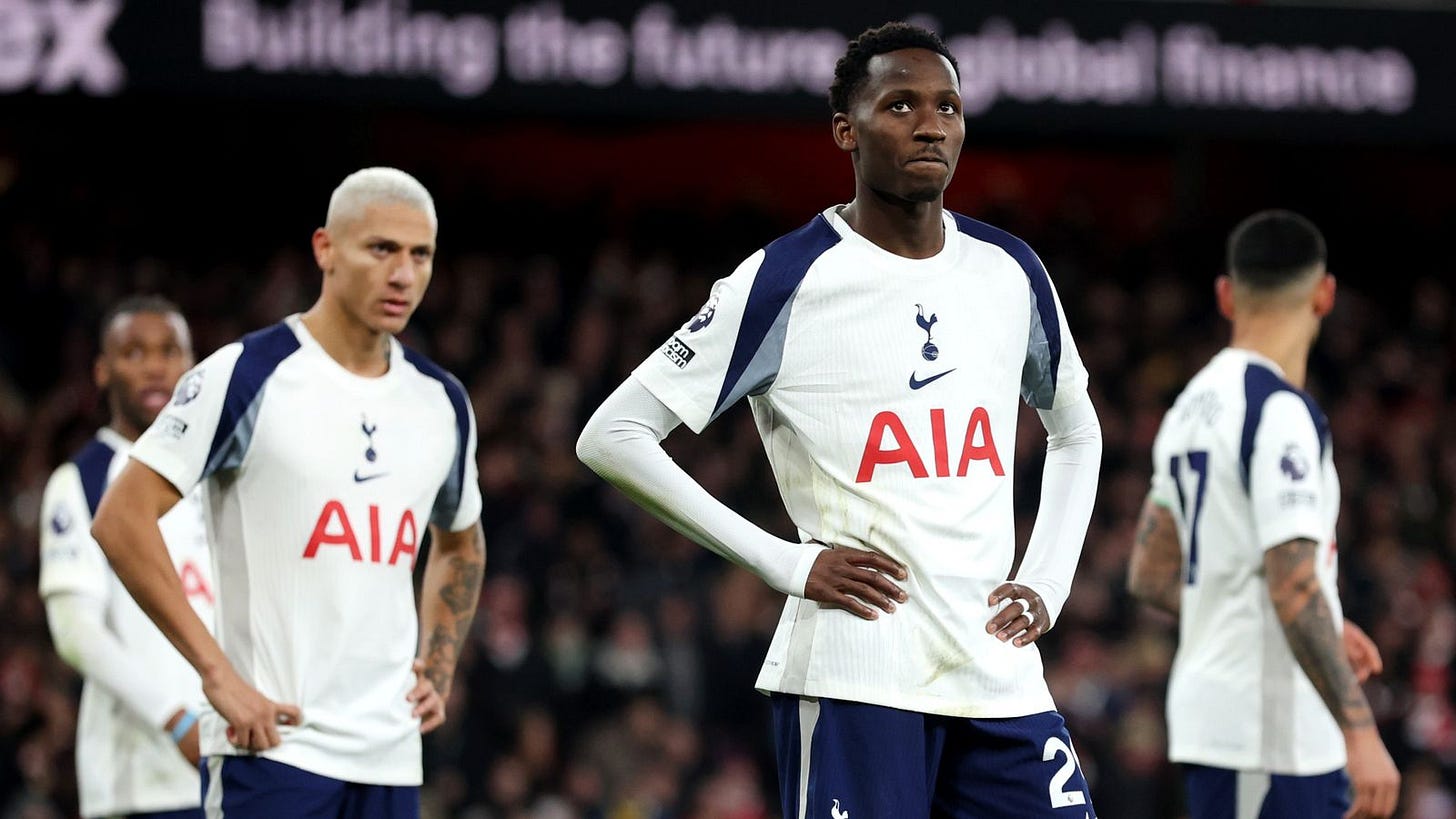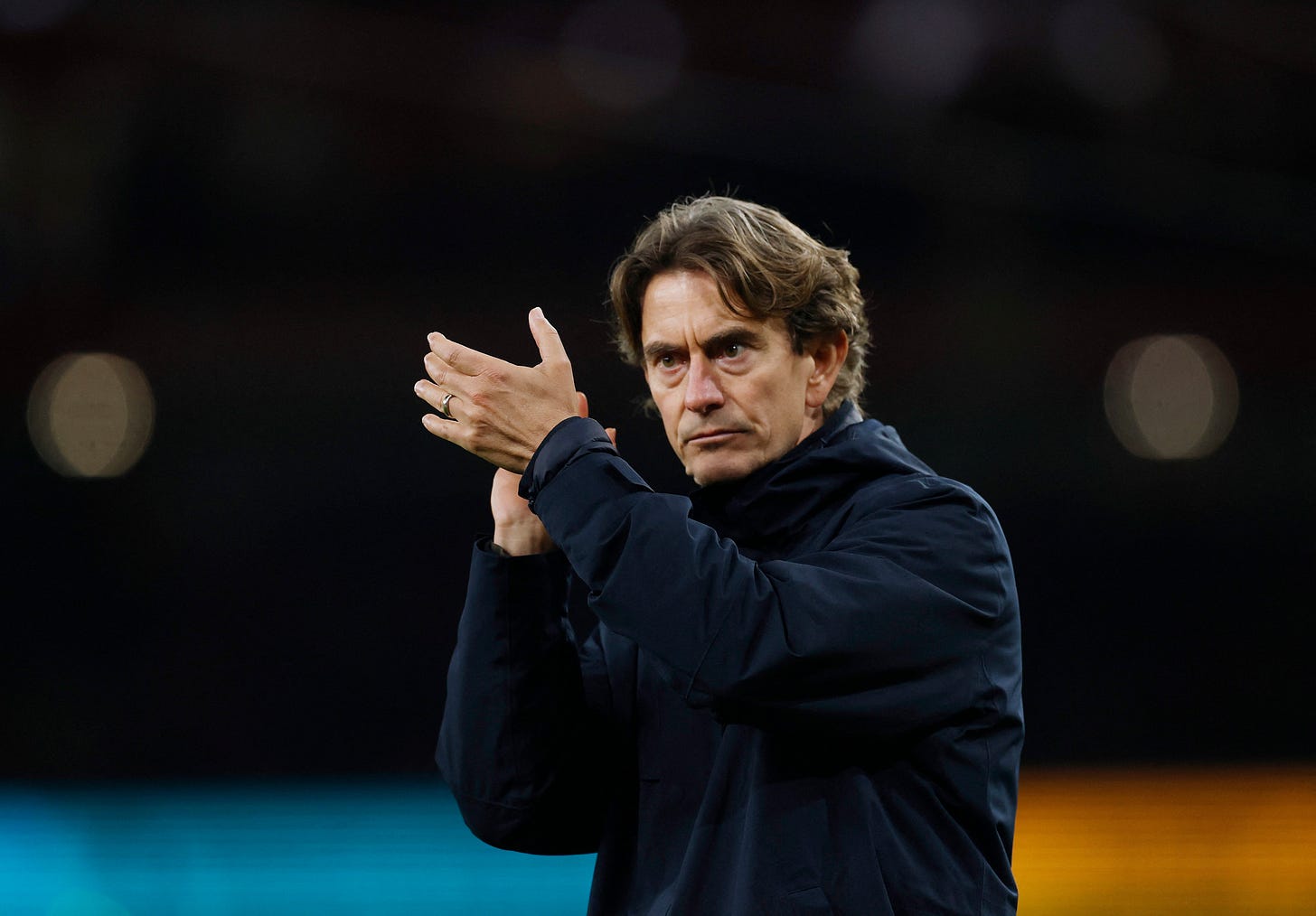Spurs Form Falters as Injuries and Poor Structure Take Their Toll
What Is Going Wrong At Tottenham Hotspur?
Tottenham arrived at the Emirates on Sunday with a plan built on caution, but left with a 4-1 defeat that exposed more than tactical fragility. It was the kind of bruising afternoon that lingers over a club, not only for the scoreline but for the way they collapsed under pressure. The manager and the goalkeeper felt compelled to apologise, their words landing heavily in the cold air around a fanbase that has grown tired of excuses.
“We can only apologise to the fans for that performance. It was a bad performance. I’ve seen a lot of character and fight in this team, but we didn’t win enough duels,” Thomas Frank said, and the candour was admirable. Yet what unfolded on the pitch demanded deeper scrutiny.
The twist of the knife came from Eberechi Eze, the forward Spurs had courted in the summer before he chose to return to his boyhood club. His hat trick gave a painful edge to an already bleak afternoon. That it arrived in a north London derby, a fixture supporters measure their pride by, made the defeat harder to swallow.
Despite sitting only three points behind fourth placed Aston Villa, Tottenham have taken four points from their past five league games. The slide has not been dramatic, but it has been steady, the kind of form that tells a story of a side losing conviction.
Below, we break down the strands of a team drifting out of shape.
Defensive Foundations Crumbling
Frank set up with a back five, a shape meant to irritate Arsenal and restrict their rhythm. He built it on methods that once brought Brentford famous victories over Liverpool, Manchester City and Chelsea. Those were days when risk met reward. Spurs, though, are a different project. Supporters expect more than survival, they expect assertion.
This cautious setup had worked earlier in the season, most notably in the UEFA Super Cup win over Paris Saint Germain and a controlled 2-0 victory against Manchester City. In both matches Tottenham scored first, which allowed the scheme to flourish. Against Arsenal, the early concession to Leandro Trossard tore the blueprint apart.
“We tried to come here and be aggressive and press high and in spells go after them,” Frank said. “We didn’t succeed with that. We didn’t manage to get near enough to them in the situations we could. It means we got pushed back and got a little too passive.”
He rejected the idea that the system itself was to blame. “I’ve seen lots of teams, including my own team, playing also 3-5-2 or 3-4-3, being very aggressive, positive, forward thinking,” he added. “That was not the case today. So I don’t think it’s about the system.”
There was a reluctance to admit the obvious. The formation invited Arsenal to take control, and Arsenal, already humming this season, accepted the offer. The back line sat deep, the wing backs rarely got out, and the intervals where Spurs tried to step forward were too short to unsettle an opponent that sensed their hesitation.
The second half reshuffle came too late. Spurs had already lost the physical battles, and once your resolve breaks in that stadium, you are left trying to keep the scoreline respectable.
Issues In Creativity And Progression
This was the third league match where Tottenham looked blunt in possession. They were tepid against Chelsea, and the late fury of their 2-2 draw with Manchester United obscured how static they were for much of that game.
The midfield pairing of Joao Palhinha and Rodrigo Bentancur sat so deep that they might as well have formed a second defensive line in front of the three centre backs. Spurs needed someone to take responsibility between the lines, yet no one showed for the ball often enough. Arsenal were without Martin Odegaard, Viktor Gyokeres and Gabriel, and Piero Hincapie was making his first Premier League start, but Tottenham never tested any of them.
Their expected goals return was bleak. They produced an xG of 0.05 against Chelsea, then lifted that only to 0.07 against Arsenal. These are the two lowest totals recorded by any Premier League team this season.
Spurs did not attempt a shot in the first half. By full time Arsenal had four goals and Spurs had recorded the same number of touches in the opposition box. Richarlison’s sweeping lob saved them from outright humiliation, but it came from a mistake rather than orchestrated play.
Frank altered the formation at half time and introduced Xavi Simons, yet Eze scored again inside a minute. Simons did bring a spark, charging through midfield on more than one occasion and even drawing a booking from Declan Rice. His rawness is clear, but so is his imagination. He needs minutes, and he needs encouragement, because Spurs lack anyone else in midfield who can draw defenders and open space.
Without that presence, Tottenham fall into long phases of sideways play. The patterns are predictable, the tempo never stretches opponents, and the attack carries no threat until Frank throws caution aside.
Injuries That Shape The Season
James Maddison, Dejan Kulusevski and Dominic Solanke would transform any Premier League attack, so their absence cuts Tottenham deeply.
Solanke links play with rare intelligence, dropping into pockets or racing behind defenders with equal comfort. Maddison and Kulusevski give progression, they carry the ball, they disguise passes, they shift the picture in the final third. Maddison’s ACL injury means he will not return this season, but Solanke and Kulusevski may be available soon, and their return cannot come quickly enough.
At present too much rests on Mohammed Kudus, a talented player asked to carry the entire creative load. Wilson Odobert has offered moments of promise, but the damage from his hamstring surgery last season slowed his development, and he is still adjusting to the standard.
It is fair to ask how much blame Frank should shoulder when so many key players are absent. Yet injuries affect every side, and elite clubs must cope with adversity. Tottenham have yet to find that resilience.
Recruitment And Responsibility
Tottenham entered the summer with the stated plan of signing Premier League proven talent, yet they missed out on Eze and Morgan Gibbs White, and ended up bringing in Simons instead. There is clear potential in the Dutchman, but he was not the first choice, nor the second.
Some of the fault lies beyond Frank. Negotiations under Daniel Levy were slow and, at times, overly cautious, particularly with Crystal Palace. Spurs committed funds on Mathys Tel despite an underwhelming loan spell, only to leave him out of their Champions League squad. Kota Takai is yet to play due to a foot injury, and Randal Kolo Muani has battled multiple setbacks.
After finishing 17th under Ange Postecoglou but sneaking into the Champions League through Europa League triumph, Spurs needed reinforcements of established quality. They received a mixture of promise and gamble instead.
Frank deserves scrutiny for performances that lack cohesion, but the larger structure, from Levy to chief executive Vinai Venkatesham to the sporting directors Johan Lange and Fabio Paratici, must answer whether they gave the manager the tools he required.
The calendar offers no kindness. After their Champions League meeting with PSG, Tottenham face Fulham, Newcastle United, Brentford and Nottingham Forest. These matches will decide whether Frank can steady the side or whether deeper questions will gather pace.
The supporters have already voiced discontent in recent home games. The derby defeat magnified that noise. As Danny Murphy put it, “they got completely overrun in the end really, outplayed and out worked and didn’t really hurt Arsenal enough.” It felt like a warning from someone who has lived the rivalry.
Frank, for his part, remains stoic. “There will be noise, we played against our biggest rivals and we lost badly, but we’ll keep noise out and focus,” he said. “I know this team is competitive. Of course it looks bad, it was not good enough.”
The truth is that Tottenham now stand at a hinge point. The next few weeks will reveal which players carry courage, who wants the ball, who can influence a contest rather than simply endure it. And they will determine whether the manager can still command belief in a squad that has lost its way.



What are your thoughts on Archie gray as he was a big player with an excellent future for us at Leeds united why has he had not much game time you think